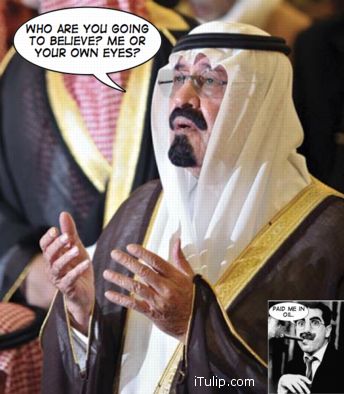 |
A collection of pre-meeting comments
(Reuters) - The world's top oil exporter Saudi Arabia finds the price of fuel unjustifiable and has called a meeting of producers and consumers on June 22 to help find a solution.
The two sides have long blamed each other, but the Saudi cabinet, chaired by King Abdullah, issued instructions to bring them together in Jeddah after oil rose last week by $16 a barrel in just over 24 hours to above $139.
Below are the latest comments by ministers and officials who are attending, or are likely to attend, the event.
Producers
OPEC SECRETARY GENERAL -- Abdullah al-Badri
June 10, London, oil near $133: "I ask through you, through Reuters, really we need some calm. We are panicking too much."
"The situation is unbearable as far as we are concerned. I want to say, there is no shortage now and in the future."
OPEC PRESIDENT -- Chakib Khelil, Algerian oil minister
June 10, Algiers, oil near $131: "It would not be wrong to discuss not only the current oil market situation, but also prices and costs because if the price of a barrel is increasing, the price of equipment and services has also tripled in two years."
"We should also not ignore, above all, the central issue which is speculation."
SAUDI ARABIA -- Oil Minister Ali al-Naimi
June 8, Riyadh, oil around $138: The Saudi oil minister agrees with his Pakistani counterpart that a double-digit price rise was unjustified and unrelated to market fundamentals.
IRAN -- Oil Minister Gholamhossein Nozari
June 10, Tehran, oil near $132: "... No one party is on its own able to solve the oil market's problems," said Mohammad Ali Khatibi, Iran's OPEC Governor.
UAE -- Oil Minister Mohammed al-Hamli (will attend)
June 10, Alberta, Calgary, oil near $131: "There is no shortage of crude oil in the market. Inventory levels are huge."
"If you look at prices moving by $10 a day, that doesn't make sense. That's crazy."
KUWAIT -- Oil Minister Mohammad al-Olaim (will attend)
June 11, Kuwait, oil above $133: "The most prominent factors leading to oil price swings are speculation in world markets and the limitations in the number of oil refineries in consuming countries and the decline in the price of the dollar."
VENEZUELA -- Oil Minister Rafael Ramirez
June 12, Caracas, oil above $136: Ramirez said the Saudi meeting would not be a forum to discuss output.
"It is not the place to agree any of these things. I hope the main consumer countries will understand that OPEC exists and that we have developed an extraordinary role in keeping the market balanced."
NIGERIA -- Minister of State for Petroleum Odein Ajumogobia
June 11, Lagos, oil above $134: "I guess it presents a welcome opportunity to review the pretty much unanimous conclusions of the Rome meeting as to the factors giving rise to the current unprecedented high price and volatility."
IRAQ -- Oil Minister Hussain al-Shahristani
June 12, Amman, oil near $134, "We believe that OPEC boosting oil output would not tackle the problem of the rise of oil prices. Even if Saudi Arabia raises production this will not influence the market."
"OPEC is not controlling global oil prices now. Futures market speculators are the ones who are behind the hike in prices."
LIBYA -- OPEC delegation head Shokri Ghanem
June 12, Tripoli, oil near $133: "Speculation is playing an important role but it is not the only factor. It is the erosion of the dollar, it is geopolitics, it is refinery bottlenecks, it is the increase in demand, it is peak oil getting soon."
NON-OPEC
MEXICO -- Energy Minister Georgina Kessel
June 11, Mexico City, oil above $134: "We have been very mindful of the call that has been made to increase production. You know perfectly well the problem that we are facing in Mexico."
Consumers
UNITED STATES -- Energy Secretary Sam Bodman (will attend)
June 11, oil near $132: "The issue is we have a difference of opinion (with Riyadh). The reason we're looking at these very high prices for oil is strictly supply and demand."
JAPAN -- Minister of Economy, Trade and Industry Akira Amari (will attend)
June 13, Tokyo, oil above $136, "Funds are buying futures on the view that there could be a shortage in the future although supplies are sufficient now. Taking action to avoid future shortages, such as raising the production capacity ceiling, would be the best message."
BRITAIN -- Prime Minister Gordon Brown (will attend)
June 12, London, oil near $133, "I am not going to Jeddah expecting there is going to be a short-term change in production."
"I will propose to the king that if necessary I will be happy to convene a follow-up summit at heads-of-government level in London as a venue."
International Energy Agency -- Executive Director Nobuo Tanaka (will attend)
June 12, Paris, oil near $133: "These high prices are not sustainable and jeopardize economic growth globally. The impact is especially acute in developing countries."
"We would welcome an opportunity to act collectively to reassure the market about future demand and supply balances in order to change the perception of extended tightness."
AntiSpin: Why is oil pushing $140? It's supply! It's demand! It's the dollar! It's the speculators! It's peak oil!
We will not be holding our collective breath through the entire event awaiting a consensus among these competing interests.
Only by comparing deeds to words over time will the truth emerge.
Hat tip to member GRG55!
Comment